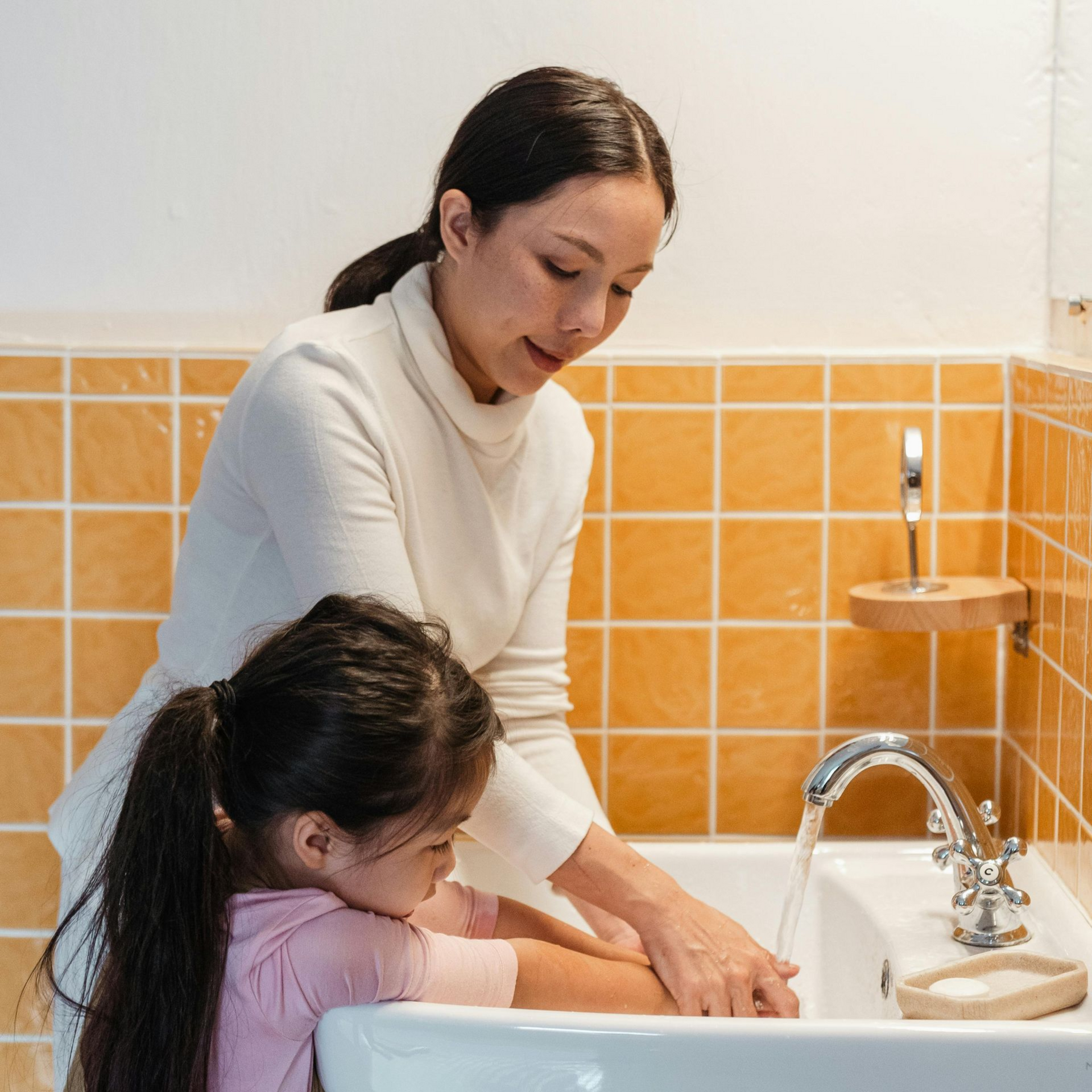The Basics of ABA
Clearing Up Confusion from Inquiry to Graduation
What Now? | End of Day Kitchen Table Thoughts
Your child has just been diagnosed with autism. The first days after a diagnosis can feel long. New terms, appointments to make, and a whole field to learn about. At the end of the day after everyone is finally in bed and packed lunches are in the fridge, you finally have that moment of silence to yourself. Maybe you’re even ready to reheat that cup of coffee from earlier you haven't had a chance to drink yet. At Vilij ABA we won’t judge if you need a little caffeine and more importantly, we’re here to be your advocates from inception of care until growth and graduation. We’ve also been known to re-heat a cup of coffee every now and then.
The truth is that any new diagnosis can be scary; many parents go through the ‘what ifs,’ the confusing jargon, and what is an emotionally taxing process. Our team understands the task of finding and understanding what ABA services are. It is through this same empathy and understanding that we approach our clients with the goal of empowering and educating families to grow and become their best self-advocate. When you understand what ABA is and how it will be incorporated into the life of your family, the results and process are simply better.
Break It Into Steps
The first step was the diagnosis of autism by a mental health care provider or pediatric neurologist. Your next step often leads you to looking for an ABA company that you feel will incorporate well into your family’s schedule.
This can mean anything from finding the right type of care (in-home, in-clinic, a combination), to those who provide a one stop shopping/multidisciplinary approach, such as physical therapy, speech, or occupational therapy. You’ll want to keep in mind what you feel will best work with your family’s needs. Will you be able to commit the time (in-home, drive time to clinic, parent meetings, working on generalizing skills outside of direct therapy)? Is your home environment one that would allow for regular sessions? Maybe your child would benefit from an in-clinic approach that offers social opportunities with other peers and then move into the in-home approach.
Equally important, when you reach out to the various companies, assess how your inquiry is handled. Are they a large company with intake coordinators who have limited clinical experience? Do not be discouraged if you are not the right fit for every company you call and answer the initial questions honestly as they will predict the success of you and your child, should you move forward with them.
ABA, Therapy That Treats Everyone
While your child will be the primary recipient of ABA Therapy, they will not be the only beneficiary of it. Everyone in the home including parents, siblings, caregivers, and anyone providing consistent interaction will need to be aware of ABA Therapy. We achieve this through collaboration, documentation, and communication with your clinical care team (BCBA, Lead RBT, RBT) as well as speech, occupational therapy, schoolteachers, coaches, and any other therapies your child receives.
Other aspects of ABA will be for the benefit of you, your partner, and/or caregivers, often referred to as “Family Treatment Guidance” or “Parent Training.” These meetings will include providing you and the members of your household a sounding board to express concerns, discuss care, and develop skills that again work and grow you and your family. In all aspects of care, be it with Vilij or other providers, you should seek someone who encourages you to be your own advocate.
You Found a Company You Feel Comfortable With
You’ve done the due diligence, talked to countless people, and you’ve settled on a company you feel you and your family can build a relationship with. So, what’s the first actual step with your new ABA provider? The assessment process. Two types of assessments will be performed for your child, an indirect and direct assessment.
The indirect assessment will consist of a review of your child’s medical history pertaining to the autism diagnosis, questions for parents and/or caregivers which speak to how your child interacts with the world around them. Typically, the indirect assessment is completed first to determine what type of assessment will be the most functional measure of your child’s independence and goals. Please take this time to be open and honest about your child's areas of need and strengths, as well as your primary goals for therapy. This will help provide a whole picture to the BCBA.
The direct assessment consists of direct observation of your child. During this assessment, the BCBA will observe your child in either the home setting, or clinic setting. The BCBA will observe how your child engages in socialization, communication, and measure how independent your child is in various skills based on the assessment being run. The following are some assessments that may be considered: VBMAPP, PEAK, ABLLS, AFLS, Vineland.
After your child completes the indirect and direct assessments, the initial assessment report will be completed, including all assessment results (graphs), narrative of the indirect assessment, goals, and recommendations. Once complete, the BCBA will sit with you to explain the goals and the assessment results to ensure the care that is provided to your child is clinically relevant but also taking into account your concerns and goals towards your child's growth.
Talking About the Assessment
Following the assessment process your BCBA will then make a recommendation as to the number of hourly services needed each week as well as a discussion on what parent training will look like. All aspects of the report should be discussed with deeper, more meaningful questions asked and answered as necessary. This process, while arduous, will often need to be repeated every 6 months to allow for authorization of services with your insurance provider. In another six months another authorization report is needed.
It is important to note that assessment goals are not set in stone. Many times, initial goals may be “easy” or you may notice that your child might be able to do this skill but did not demonstrate it with the BCBA. This could be because the provider is new and there is a “warm up” period, a time that it takes for your child to befriend the BCBA and the team. This could also be because the team may need to work on generalization of skills; where your child may be able to complete a task independently with you but has not transferred this skill across other individuals. That being said, be open with your BCBA and ask them what the plan is moving forward with this skill. Oftentimes, easier tasks are used to build rapport with your child and are helpful in the pairing process and introduction to more difficult tasks.
Submissions of Assessment to Insurance
Once a report is submitted to insurance, insurance will then have a 15-day period in which they will look over the report to decide whether they will give full authorization of hours or part authorization of hours. At times, a peer review call may be scheduled with your family’s BCBA and the BCBA from the insurance. These peer review calls may be scheduled to discuss, in more depth, the clinical goals and outcomes of therapy. Once authorization is provided, either your insurance or your ABA provider should notify you of the decision. At times, insurance providers may be backlogged, so it may take more than 15 days for a decision to come forth from the insurance providers. If it is taking long, it may be helpful for the parent/insurance carrier to call the provider to inquire about the length of wait. Your ABA team will also be calling insurance after that 15 day wait period to ensure that the insurance authorization team is reminded of the report.
Once authorization is approved by insurance, the ABA therapist or team of ABA therapists will start direct sessions with your child. Sessions will start with a focus on pairing with your child. Pairing is another way of saying the team will be building rapport with your child, getting to know your child and building a level of comfort which is imperative for a healthy clinical relationship. Also, you should expect to meet with your BCBA; discuss with your BCBA how often you’d like to meet or what the expectation is for this.
Therapy Begins
Depending on the setting of ABA therapy your child will be receiving, therapy will either occur in the clinic, in the home, or a combination of both. There may be instances in which your clinical team may work with your child in the school setting; please be sure to reach out to your BCBA if this is something you would like to explore.
ABA is an individualized therapy, focused on either comprehensive or intensive (focused on one area before moving forward to a potential comprehensive type) therapy. Not all behaviors/skills may occur in all settings and the goal will be to identify and work on those behaviors/skills as identified by the parent/caregiver and BCBA.
In addition to direct ABA sessions with your child, there will also be parent trainings/meetings. In the first few months of services, you should expect that many questions will be asked (by you and by the BCBA). This is ok and encouraged. Ask open ended questions as to how sessions are going, is there something you don’t understand or a graph that confuses you? Empowering your family means educating on all aspects of ABA to understand how therapy being provided leads to your child’s growth. Are goals within your child’s programming being met? Are they being supplemented with additional programming goals? Has your child regressed in certain behaviors, if so, why? While anecdotally you may see improvement with your child’s behaviors, the data that is recorded is what will allow insurance to authorize more therapy, and as your child grows, lead to the eventual graduation from services.
Ongoing Therapy
Depending on your insurance provider, reassessments will be required every 6 months, with reports that speak to the growth of your child. Depending on your situation this can include direct and indirect assessments, new reports written, and a comparison of your child from the previous authorization point that looks at the data collected during sessions. In the reassessment you may have the following: list of masters goals/targets; if there are a lack of goals being met, a rationale for why those were not met; if there is a change in assessment type (ex, changing from VBMAPP to AFLS), an explanation as to why; the results of the assessment/graphs may change; if there is a loss of progression with certain goals, an explanation as to why; and if the hour recommendations change (ex, decrease of direct hours or increase of direct hours), and explanation as to why.
Graduation
ABA takes work but eventually a child may reach a point where their challenging behaviors have decreased/their skill set has expanded to match their neurotypical peers and they no longer need our services. Our goal as providers is to graduate your child out of services and alternatively, us out of a job. It is important to note that there should be criteria for decreasing hours/graduation in assessment reports. ABA services are a long road but we’ve seen countless families put in the work. When someone believes in your family and provides the support and education needed to empower your family, your child grows.
Are You Ready to Take Your First Step?
At vilij ABA the successes of your family are our successes, your concerns are ours, and the growth of your child is more than the documented data we take. Therapy doesn’t end when your RBT completes a session for the day and we appreciate the opportunity to make an impact on your child’s growth. An honor we do not take for granted.
Whether you’re ready to take the first step and call 630-777-2800 or email contact@vilijaba.com to speak with one of our representatives or maybe you need to read some more of the information on our site, we wish you success on your journey.
Accountability |
Integrity |
Empathy |
Collaboration










